



to the
Musekal PhiloSophy
page
"Philosophy In a New Key"
.
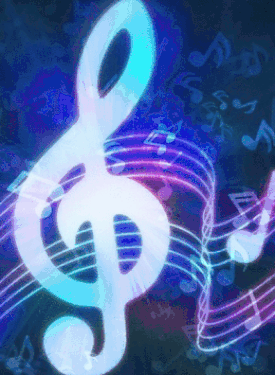

.
This webpage is meant to give the Gypsy Scholar's listeners a conceptual-visual aid--to "see what I mean"--for better understanding his central program meme of Musekal Philosophy (and it's literary conceits), which technically means that the philosophical essay, in the form of the "Orphic Essay-with-Soundtrack," aspires to the condition of music--the condition of music translated into words. And so the "words" from "books" are mixed and remixed with "pictures" (images) and "songs," in order to give listeners a program of "delight"--in that musical palace the Gypsy Scholar calls TOWER OF SONG In general, this webpage provides a kind of conceptual map-theory for guiding listeners to find the musical key to unlock the meaning of the TOWER OF SONG program. It is hoped, therefore, that this webpage will give a conceptual understanding of the Gypsy Scholar's "Musekal Philosophy," as it manifests in what he calls "scholarship as performance art." Thus, the Gypsy Scholar--as DJ Orfeo--can say: "I'm a Rocker in the life of the mind and the world of ideas." (Click the link below for "The Re-Vision Radio Manifesto & Visionary Recital" to "see what I mean" by the Orphic Essay-with-Soundtrack.)


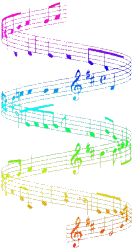


.

"El Maestro-Orpheus"
Orpheus is philosophy personified.
–Francis Bacon
Let us bring to bear the persuasive powers of sweet-tongued Rhetoric and . . . let us have as well Music,
the maid-servant of my house,
to sing us melodies of varying mood. –Boethius (Consolation of Philosophy)
Music is our myth of the inner life--
a young, vital, and meaningful myth...
–S. K. Langer (Philosophy in a New Key)
Three-cord rock merging
with the power of the word.
–Patti Smith

.


The Bards of the Tower of Song


.

.

.
The Gypsy Scholar takes you back—way, way back—to the origins of Musekal Philosophy
.
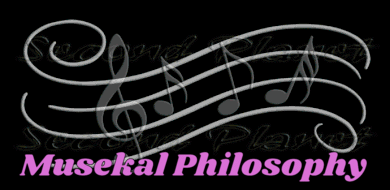
.





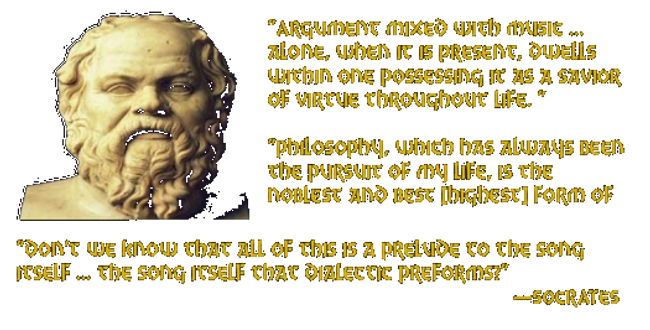


.

.
.


.
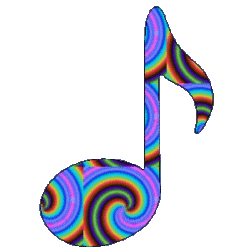
Note: The Gypsy Scholar found this fantastic connection between philosophy and music after the fact; that is, the quotes from Plato's dialogues were discovered after the GS began his radio program, when he went looking for validation for his intuition concerning the relationship between philosophy and song, which was the basis for the "Orphic Essay-with-Soundtrack" (for "Argument & Song"). Therefore, for the GS, the last quote from Socrates (i.e., "all of this" and "dialectic") translates as "all of the argument (of the musical essay) is simply a prelude (a "lead-in" in radio jargon) to the song itself, the song that the musical essay performs." This being the case, it raises the question of the relationship between the essay and the song: Does the song exist for the sake of the essay (as one would assume were it not for radio), or does the musical essay exist for the sake of the song? I mean, after all the performances of the "Orphic Essay-with-Soundtrack" the GS has done, is it not appropriate to ask his listeners: "Don't we know (by now) that the essay is really a prelude to the vital thing--the song itself?
.
Orpheus & the Power of Music
.

ORPHEUS. “And they produce a host of books written by Musaeus and Orpheus, who were children of the Moon and the Muses.” —Plato, Republic II
.
The Greek version of the archaic shaman is the daimon Orpheus, whose voice and lyre provides the “song-way” or “songlines” (oima), through his “magical activity” of “incantation” (epoidos), to both the “Music of the Spheres” and the "inner music of the soul." (This "soul-music" has its counterpart in the music from afar, the heavenly music of the spheres.)
For Plato (Laws), just as the planets are hung upon the axial Spindle of Necessity, human beings are strung upon a necklace of the gods. Plato speaks of the “thread of song and dance” upon which we are strung, like possessed Maenads. This divine inner thread is identified with rhythm and melody, not the logos. Plato (Phaedo) has Socrates declare that philosophical arguments are a form of “enchantment,” even having Socrates himself become identified as an “enchanter.” Plato (Phaedrus) also invents a myth in which the cicadas are described as descendants of an earlier race of men who, were so charmed, enchanted, enraptured, enthralled, fascinated, mesmerized, bewitched (epadein), by song, when introduced into their midst by the Muses, that they forgot to eat and thus staved to death singing.
Therefore, the purpose of the Orphic Essay-with-Soundtrack can be understood as following Orpheus’(shamanic) incantatory "song-way" or "songlines" (of the planet) in order to reconnect with the primordial ”thread of song and dance" (in the "Daring Night") and hear the both the Pythagorean "Music of the Spheres" and the Orphic "inner music of the soul." The Orphic Essay-with-Soundtrack attempts to connect up with this magical Orphic music, this "soul-music"—even if it’s in danger of making listeners so “enchanted”that they forget all else and sing themselves to ego-death!
.


.jpg)
Marsilio Ficino was known as "The Second Orpheus." This Italian Renaissance humanist scholar was also a Neo-Platonist philosopher and archetypal music therapist. As a “doctor of soul,” he healed melancholy through music (mostly artists, poets, and scholars whose temperament was particularly susceptible to the “black bile”). Because, for Ficino, the spirit of man corresponds to the spirit of the world and can receive from it a great deal through the rays of the planets, he recommended that while you could use animals, plants, food, scents, and talismans to attract the spiritual influence of a particular planet music is best.
For Ficino, sounds, especially the sounds of music, render "the real nature of things,” which is "the effectiveness of motion." Motion here, is above all in the psychic sense of e-motion. Thus music expresses the "real nature of things," because it expresses the emotions; affects feelings that are linked to, or projected upon, them.
"… if vapors exhaling from a merely vegetable life are greatly beneficial to your life, how much more beneficial do you think will be songs which are made of air to a spirit wholly aerial …." —Ficino, Three Books on Life
.
.
Philosophers, Poets & Songwriters on Music






























Socrates: “... wonder is the feeling of a philosopher, and philosophy begins in wonder.” (Plato, Theaetetus)
.

.
Why Muse-ekal Philosophy? The Muses: Music & Philosophy
.


Euterpre, Muse of Lyric Poetry/Music
.
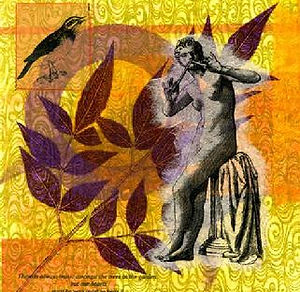

The name of muses and the term music derive etymologically from the same Greek word—mosthai = mousa (muses) and mousike (music)—and would seem to be derived from the muses "making philosophical inquiries." The word music literally means "art of the muses" (mousa = mousike; music). Because the Platonic conception of philosophia means "loving," "inquiry," and "searching," which originates from the singing muses, the Gypsy Scholar rejects the later, formal separation of Philosophy from Music—i.e., from love (eros), inquiry, and questing. Thus the Gypsy Scholar re-visions Western Philosophy ("love of wisdom") as a musical Quest-Romance, where not only is Philosophy the “highest form of music" (Socrates) but, conversely, music is the highest form of Philosophy. This re-visioning of Philosophy into "Musekal Philosophy" entails the playing out, through the Orphic Essay-with-Soundtrack, of the complex dialectical relationship between Argument (logos) & Song (mythos).
Plato writes that the Muses have “the gift of speculative knowledge” and are “of one mind,” desiring to “express themselves in song.” Plato also suggests that the Muses and music in general are named from mosthai, which means "searching, inquiry, and philosophy" (i.e., "to strive after," "to long for," or "to desire eagerly"), and partake of similar meanings as does philosophia (i.e.; "loving," "inquiry," "searching"). These Platonic conceptions within philosophia ("love of wisdom") go back to Hesiod’s (mythopoeic) primary account of the Muses, which again expresses their unifying nature.
All of this suggests that we question the later, formal separation of philosophy from music, love, and questing. Furthermore, for Plato, the third form of mania (divine madness), a gift from the Dionysus, is the "poetic madness" of the Muses. This gives evidence that Plato’s philosophy is akin to poetry, for the Muses inspired the words that the poets breathed, such as the primary figure of the poietes (inspired bard) and then the rhapsode (inspired reciter). It has been suggested that both these figures were wedded by Plato to his ideal of the philosohos
(philosopher-lover), and that it is Orpheus, son of the Muse Calliope, who serves as Plato’s model for the new kind of poet-philosopher. That philosophy (a form of “play”) in Plato’s view is more of an art is suggested by the fact that it is the Muses who are represented over the entrance to his Academy and their important feast days were singled out for inclusion in the Academic year.
.

.
Allegorical Personifications of Music & Poetry
.
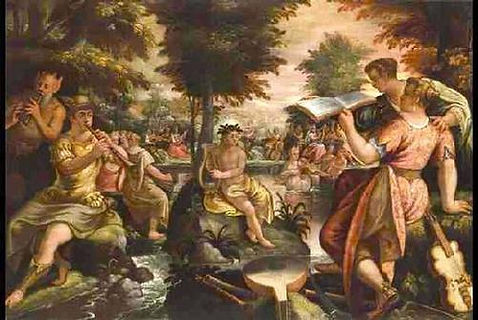.jpg)
"Allegory of Music" (Franck)
.jpg)
.jpg)
"Allegory of Music and Poetry" (Conca)
.jpg)
"Personification of Music" (Natoire)
"Allegory of Music" (de La Hyre)

.jpg)
"Lyric Poetry" (Walker)
"Art of Music" (Trevisani)
.

.
The Gypsy Scholar's Process of Musekal Philosophy
.

.

books + music = "Musekal Philosophy"
.jpg)
"Joni" (Laniois)
.


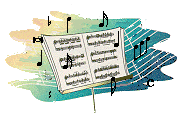






.

.
The Gypsy Scholar's Fantasy of the Scholar-Musician or "Orphic Scholar"
.

.
The Orphic Essay-with-Soundtrack is based upon the nineteenth-century "Romantic Essay" (developed by Wordsworth and Coleridge), which was described as a "conjunction of Reason and Passion that did not draw particularly sharp lines of differentiation between ‘poetry’ and the ‘impassioned, eloquent, and powerful prose'." Thus, the Orphic Essay-with-Soundtrack, like the "Romantic Essay," begins with an "impassioned, eloquent, and powerful prose, following from a fairly strict following of traditional ‘public’ discourse to modes of prose requiring the virtual abandonment or annihilation of such discourse and often quite literally disappearing into poetry or into the silence of contemplation and vision."
Therefore, to conclude this long meditation on Musekal Philosophy, with a coda, here's the Gypsy Scholar's secret ecstatic fantasy ("scholarship as performance art") that he wants once and for all communicate to his listening audience, so they can really "see what I mean."
"Have you now learned my song? Have you guessed what it means, its intent? Well then, you higher men, sing me now my roundelay. Sing me this song yourselves now, whose name is 'One More Time' and whose meaning is 'into all eternity'—sing, you higher men, Zarathustra’s roundelay!" (Nietzsche, "The Nightwanderer's Song" from Thus Spoke Zarathustra)
In the Tower of Song, when the music that is lurking in the syntax of the essay (the heretofore unheard rhythm of the prose) is amplified through the performance engine of the dialectic, it manifests in song. It works like this:
The Orphic Scholar's lecture becomes more and more inspired and rhapsodic ("Reason in her most exalted mood"). His heightened speech ("rave on words on printed page"), taking on a hortatory and edifying tone (“associate ideas in a state of excitement”), as he enters the Socratic rapture-trance (of the ancient philosopher as “enchanter”), when it can no longer be contained in the strict form of discursive exposition, spills over with philosophical jouissance (joy) into the Dionysian energy of ecstatic vision (the text read as a "visionary recital'), and the next thing you know Orphic Scholar (fulfilling the Socratic ideal of the "fervent" philosopher-musician) abandons his academic podium — he breaks out into enraptured song:
"... one, two, three, four ... But all joy wants eternity,—wants deep, deep eternity!" (Nietzsche)
Now the traditional Western dualism of knowledge and love — logos and mythos; discursive reason and poetic imagination, head and heart, argument and song — is overcome. Knowledge is eroticized and made a form of Love, and thus analytical thinking gives way to jouissance and mystical contemplation.
.
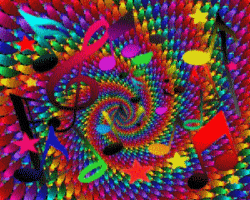
.
Suddenly, the Lecture Hall in the TOWER OF SONG is transformed into the Concert Hall, and the scholar (the Professor of Song), instead of merely presenting his thesis discursively, straps on an electric guitar or a bebop sax and, as a performing scholar (the Orphic Scholar), sings out, in oracular voice, his thesis ("Philosophy in a New Key").
"Sing me this song yourselves now, whose name is 'One More Time' and whose meaning is 'into all eternity'..." ~ Nietzsche (As Van the Man often prompts his band:
"One More Time!")
"That's why I'm telling you in song."
(Van Morrison)
.


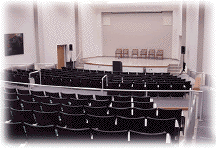

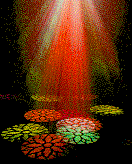







All Videos
Universities and concert stages are obviously two separate genres of performances: the former for scholars and the latter for the common run of people. This is typical of the Western way of separating sciences from humanities; the former considered as being "objective" and the latter "subjective." As Guy Beck stresses: "Referred to as the 'old paradigm' by more progressive thinkers, this dichotomy of insider/outsider or musician/scholar, also known to anthropologists as emic/etic, has continued to inform attitudes for well over a century."
.
Little village baby, ain't large enough to be a town
From a little village baby, ain't large enough to be a town
Gotta get away from the city
It's gonna bring you down
Heard the voice of the silence, in the evening
In the long cool summer nights
Heard the voice of the silence, in the evening
In the long cool summer nights
Telling me not to worry
Everything's gonna be all right
There's only two kinds of truth
Baby let's get it straight from the start
There's only two kinds of truth
Let's get it straight from the start
It's what you believe
Baby in your head and your heart
Heard the bells ringing
Voices singing soft and low
Heard the bells ringing
Voices are singing soft and low
Way up in the mountain, little village in the snow
Raining in the forest
Just enough to magnetize the leaves
Raining in the forest
Just enough to magnetize the leaves
We’ll go walking baby with the moonlight
Shining down through the trees
Little village, way up on the mountainside
Little village baby, way up on the mountainside
Way across the ocean with you by my side
(Van Morrison, "Little Village")
.

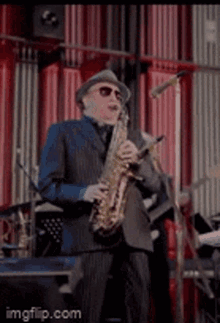


.
A Note on "Little Village" & Nietzsche
This particular song has the virtue of having as its title and subject of “Little Village.” Why? Primarily because Nietzsche—the most musical of all European philosophers of the time (both a philosopher writing on music and a musician and composer himself)—in exile from his university position, became a vagabond scholar, traveling all around Europe, from the little villages of the sunny Italian Mediterranean (Turin) to the snow-capped Alps of Switzerland (Sils-Maria). Ah, yes, “little village, baby”!
Nietzsche later lamented the way he presented his book, The Birth of Tragedy: From the Spirit of Music: “It should have sung, this ‘new soul’—and not spoken! What I had to say then—too bad that I did not dare say it as a poet.”
Help in forming this webpage section came from two books: first, Nietzsche’s The Birth of Tragedy: From the Spirit of Music; the second being about Nietzsche’ s road-scholar wanderings, The Good European: Nietzsche’s Work Sites in Word and Image (especially chapter 3, “The Solitude of High Mountains”).
For an explanation of the meaning of the scholar-musician conceit,
click button to read the GS's "Philosophical Postscript to Musical Philosophy."
.
Nietzsche as the First Modern Scholar-Musician or "Orphic Scholar"
.





Nietzsche, the Scholar-Musician

.
Nietzsche, the Wandering Scholar-Musician
.

.
It was in the Alpine "little village" of Sils-Maria in Switzerland where Nietzsche, the wandering scholar, gave birth to his biggest ideas.
.
Nietzsche, the Scholar-Musician, On Dance
.


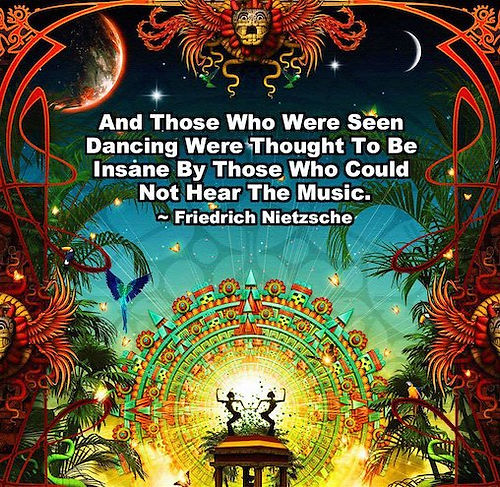


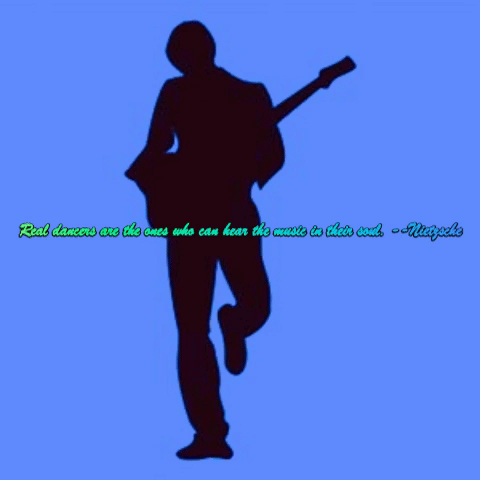
"Real dancers are the ones who can hear the music in their soul." ~ Nietzsche
.
Orphic Scholars Nietzsche and Emerson on the
Troubadour Concept of the "Joyous Science"
.





"la gaya scienza" = the joyous science (from the gai saber of the Troubadours).
.














